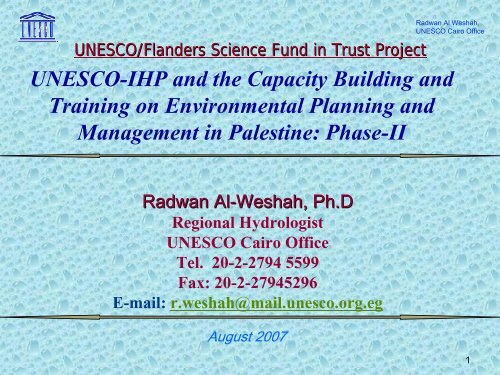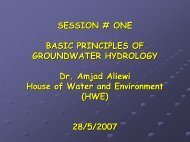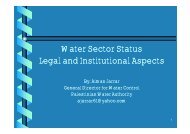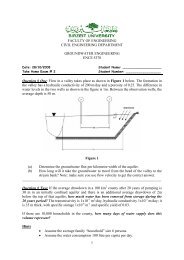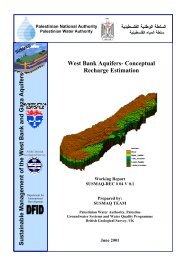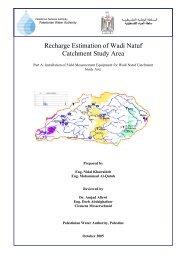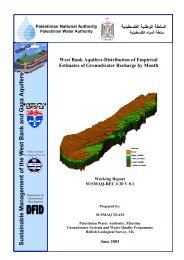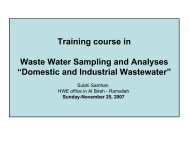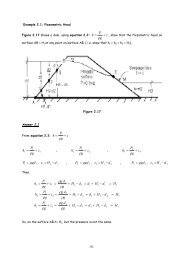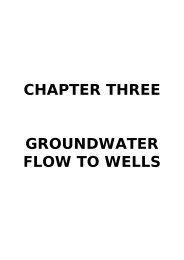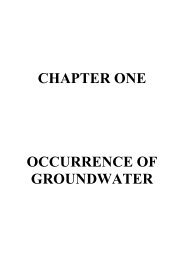UNESCO-IHP and the Capacity Building and Training ... - Hwe.org.ps
UNESCO-IHP and the Capacity Building and Training ... - Hwe.org.ps
UNESCO-IHP and the Capacity Building and Training ... - Hwe.org.ps
You also want an ePaper? Increase the reach of your titles
YUMPU automatically turns print PDFs into web optimized ePapers that Google loves.
Radwan Al Weshah,<strong>UNESCO</strong> Cairo OfficeThe International Hydrological Program(<strong>IHP</strong>)♦The <strong>IHP</strong> of <strong>UNESCO</strong> is a vehicle through which MemberStates can upgrade <strong>the</strong>ir knowledge of <strong>the</strong> water cycle <strong>and</strong><strong>the</strong>reby increase <strong>the</strong>ir capacity to better manage <strong>and</strong>develop <strong>the</strong>ir water resources.♦♦Main Objective of <strong>IHP</strong> is to improve <strong>the</strong> technological <strong>and</strong>scientific bases for <strong>the</strong> development of methods <strong>and</strong> <strong>the</strong>human resource base for <strong>the</strong> sustainable management ofwater resources at various scales through research, capacitybuilding <strong>and</strong> transfer of knowledge.The Regional Hydrologist is responsible for planning <strong>and</strong>implementing <strong>the</strong> <strong>IHP</strong> activities in <strong>the</strong> region (both regularbudget <strong>and</strong> extra-budgetary projects)2
History of <strong>IHP</strong>Radwan Al Weshah,<strong>UNESCO</strong> Cairo Office1965-1974 IHD: Experimental BasinsWorld Catalogue of Very Large FloodsWorld Water Balance & WR of <strong>the</strong> Earth1975-1989 <strong>IHP</strong>(I-III): First Three Phases of <strong>IHP</strong>1990-1995 <strong>IHP</strong> IV: Hydrology <strong>and</strong> Water Resources for SustainableDevelopment1996-2001 <strong>IHP</strong>-V: Hydrology <strong>and</strong> Water Resources under VulnerableEnvironment2002-2007 <strong>IHP</strong>-VI: Water Interactions:Systems at Risk <strong>and</strong> Social Challenges2008-2013 <strong>IHP</strong>-VII: Water Dependencies:Systems under Stress <strong>and</strong> Societal Responses3
Radwan Al Weshah,<strong>UNESCO</strong> Cairo OfficeThemes of <strong>IHP</strong> VI (2002-2007)2007)Water Interactions: Systems at Risk <strong>and</strong> SocialChallengesThemes of <strong>IHP</strong> has been mapped to Mainline of Actions (MLA)<strong>and</strong> Actions (A) in <strong>the</strong> 31 C/5.Theme 1 (T1)Theme 2 (T2)Theme 3 (T3)Theme 4 (T4)Theme 5 (T5)Global Changes <strong>and</strong> Water Resources (MLA1, A-3)Integrated Watershed <strong>and</strong> Aquifer Dynamics ((MLA1, A-4)L<strong>and</strong> Habitat Hydrology (MLA1, A-5)Water <strong>and</strong> Society (MLA2, A-1)Water Education <strong>and</strong> <strong>Training</strong> (MLA2, A-2)Two cross-cutting programme components: FRIEND (Flow Regimesfrom International Experimental <strong>and</strong> Network Data) <strong>and</strong> HELP (Hydrologyfor Environment, Life <strong>and</strong> Policy) have been identified which, through <strong>the</strong>iroperational concept, interact with all <strong>the</strong>mes.4
Radwan Al Weshah,<strong>UNESCO</strong> Cairo Office<strong>IHP</strong>-VII:Water Dependencies:Systems under Stress <strong>and</strong> Societal ResponsesEducation, transfer of knowledge <strong>and</strong> capacity buildingTHEME I:Global Changeson Watersheds& AquifersTHEME II:GovernanceforSustainabilityTHEME III:EcohydrologyforSustainabilityTHEME IV:Water <strong>and</strong> LifeSupportSystemTHEME V:Education <strong>and</strong><strong>Training</strong> forSustainabilityCross Cutting Programmes: The FRIEND <strong>and</strong> HELP5
Complexity requires new approachRadwan Al Weshah,<strong>UNESCO</strong> Cairo Office7
Radwan Al Weshah,<strong>UNESCO</strong> Cairo OfficeWater Solidarity in UN System• Brought UN Agencies toge<strong>the</strong>r in assessingwater issues• UN Water has recognized• WWDR as <strong>the</strong> flagship product• WWAP as <strong>the</strong> flagship programme• Production of African Water DevelopmentReport• The 2 nd WWDR was published in MexicoCity March 2006• Arab water resources report/digitalmap (in process)8
Radwan Al Weshah,<strong>UNESCO</strong> Cairo OfficeWorld Water Assessment Programme (WWAP)The State of The World’s Freshwater Resources9
Radwan Al Weshah,<strong>UNESCO</strong> Cairo Office10
Radwan Al Weshah,<strong>UNESCO</strong> Cairo Office11
Radwan Al Weshah,Water Challenges in <strong>the</strong> Arab<strong>UNESCO</strong> Cairo OfficeRegion• Aridity (low rainfall <strong>and</strong> high evaporation)• Population growths—food security• Deterioration in water quality• Social <strong>and</strong> economic development• Complexity in hydropolitics (water sharing/conflict)• Efficiency in water distribution <strong>and</strong> use• Public awareness <strong>and</strong> education• Water strategies/ institution/human resources12
Radwan Al Weshah,<strong>UNESCO</strong> Cairo OfficeWater Stress Index• For moderately developed countries in arid zones,renewable freshwater resources below 1,000m 3 /person/year results in chronic water scarcityimpeding development <strong>and</strong> harming human health• Water scarcity: :
Water Availability Indicators in <strong>the</strong> Arab RegionCountryWater availabilityworldwide ranking(out of 182)Water resources:Radwan Al Weshah,<strong>UNESCO</strong> Cairo OfficePopulationdensity in 2000(Inh / km 2 )Total renewable(Km 3 /year)Total renewable percapita (m 3 /capita/year)Mauritania 95 11.4 4,278 3Iraq 108 75.42 3,287 52Sudan 129 64.5 2,074 13Comoros 140 1.2 1,700 317Syria 141 26.26 1,622 88Somalia 144 13.5 1,538 14Lebanon 149 4.41 1,261 342Morocco 155 29 971 67Egypt 156 58.3 859 68Tunisia 162 4.56 482 61Algeria 163 14.49 478 13Djibouti 164 0.3 475 27Oman 165 0.99 388 12Yemen 168 4.1 223 35Bahrain 169 0.12 181 928Jordan 170 0.88 179 55Saudi Arabia 173 2.4 118 9Libya 174 0.6 113 3Emirates 178 0.15 58 31Gaza 179 0.06 52 2,834Kuwait 180 0.02 10 107West Bank 181 0.75 -- --Source: World Water Development Report, World Water Assessment Programme (WWAP), <strong>UNESCO</strong>, 200314
CountryPopulation(2005)TARWRPer CapitaSurfaceWaterGroundWaterOverlap(SW & GW)Total Usethous<strong>and</strong>s m 3 /yr % % % %Algeria 32,339 440 12 92 6 42Bahrain 739 157 3 0 0 258Djibouti 712 420 100 5 5 3Egypt 73,390 790 1 2 0 118Palestine 1,376 41 0 82 0Iraq 25,856 2,920 45 2 0 57Jordan 5,614 160 45 57 25 115Kuwait 2,595 8 0 0 0 2,227Lebanon 3,708 1,190 93 73 57 31Libya 5,659 106 33 83 17 802Mauritania 2,980 3,830 1 3 0 15Morocco 31,064 930 76 34 10 44Oman 2,935 340 94 97 91 137Qatar 619 86 2 94 0 554Saudi Arabia 24,919 96 92 92 83 722Somalia 10,312 1,380 40 23 21 23Sudan 34,333 1,880 43 11 8 58Syria 18,223 1,440 18 16 8 76Tunisia 9,937 460 68 32 9 60UAE 3,051 49 100 80 80 1,538Yemen 20,733 198 98 37 34 162TARWR: Total Available Renewable Water ResourcesRadwan Al Weshah,<strong>UNESCO</strong> Cairo OfficeWater Availability Indicators in <strong>the</strong> Arab RegionSource: 2 nd World Water Development Report, World Water Assessment Programme (WWAP), <strong>UNESCO</strong>, 200615
<strong>UNESCO</strong>/Fl<strong>and</strong>ers Science Fund in Trust Project<strong>Capacity</strong> <strong>Building</strong> <strong>and</strong> <strong>Training</strong> on EnvironmentalPlanning <strong>and</strong> Management in Palestine:Phase-IIThe <strong>Capacity</strong> <strong>Building</strong> <strong>and</strong> <strong>Training</strong> on EnvironmentalPlanning <strong>and</strong> Management in Palestine Phase-II is fundedby <strong>the</strong> Government of Fl<strong>and</strong>ers, executed by <strong>UNESCO</strong> <strong>and</strong>implemented by <strong>the</strong> water research institutions <strong>and</strong>universities in Gaza <strong>and</strong> West Bank. The second phase of<strong>the</strong> project was officially launched in <strong>the</strong> PalestinianTerritory in January 2003.The overall objective of <strong>the</strong> project is to ensure <strong>the</strong> longterm conservation of <strong>the</strong> water resources in <strong>the</strong>Palestinian Territories through building capacities <strong>and</strong>setting up a water resources network to foster <strong>the</strong>cooperation between <strong>the</strong> actors in <strong>the</strong> field, with respectto training, research <strong>and</strong> public awareness.Radwan Al Weshah,<strong>UNESCO</strong> Cairo Office16
Radwan Al Weshah,<strong>UNESCO</strong> Cairo OfficePhase-II Management Levels‣ Steering Committee (SC)(Administration <strong>and</strong> Management)‣ Technical Network Commission (TNC)(Technical Supervision)17
Radwan Al Weshah,<strong>UNESCO</strong> Cairo OfficeSteering committee (SC) members• <strong>UNESCO</strong>• The Flemish Government• The Palestinian Ministry of HigherEducation• PWA (Palestinian Water Authority)• Al-Azhar Azhar University• Two representatives from <strong>the</strong> TNC:- Dr. Hasan Shaban (Gaza)- Dr. Anan Jayyousi (West Bank)18
Radwan Al Weshah,<strong>UNESCO</strong> Cairo OfficeThe tasks of <strong>the</strong> SC are:• Control <strong>and</strong> compliance of <strong>the</strong> training <strong>and</strong>research projects to <strong>the</strong> project objectives,• Evaluation <strong>and</strong> approval of deliverables of <strong>the</strong>latter projects, <strong>and</strong>• Budget control <strong>and</strong> evaluation of <strong>the</strong>documentation center.19
Radwan Al Weshah,<strong>UNESCO</strong> Cairo OfficeTechnical Network Commission (TNC)• Invitations has been sent to <strong>the</strong> water relatedinstitutions to participate or nominate members in TNC• Selection of <strong>the</strong> TNC members has been approved by<strong>the</strong> SC• Two members have been elected to attend <strong>the</strong> SCmeetings.20
The participating institutionsRadwan Al Weshah,<strong>UNESCO</strong> Cairo Office• Eleven institutes have submitted researchproposals:1. Al Azhar University, Gaza2. An-NajahUniversity, Nablus3. Bethlehem University4. Bir Zeit University5. Palestinian Environmental Water Quality Authority6. Islamic University Gaza7. Palestinian Hydrology Group8. Palestinian Ministry of Agriculture9. Purdue University, USA10.Palestinian Water Authority11.Water <strong>and</strong> Environmental Studies House21
Phase-II WorkplanRadwan Al Weshah,<strong>UNESCO</strong> Cairo Office• The duration is 48 months (4 years) startingfrom January 2003.• It was agreed to extend <strong>the</strong> duration of <strong>the</strong>project for one additional year (2007)22
Radwan Al Weshah,<strong>UNESCO</strong> Cairo OfficeImplementation• Total approved budget for years 2003-2007 2007 is$850,000.• Overall implementation of <strong>the</strong> project will becompleted by end of year 200723
Radwan Al Weshah,<strong>UNESCO</strong> Cairo OfficeResearch PrioritiesThe Technical Network committee (TNC) identified<strong>the</strong> following priority areas for research:• Contaminate Transport Models• Water Resources Management• Water Laws <strong>and</strong> Legislation• Groundwater Protection <strong>and</strong> Management• Water Dem<strong>and</strong> Assessment• Surface Water <strong>and</strong> Flood Hydrology• Socio-economic Aspects of Water Resources• Climatic Data Collection <strong>and</strong> Processing24
Radwan Al Weshah,<strong>UNESCO</strong> Cairo OfficeResearch Projects implemented in 2003-20042004• 10 research projects were funded.• All <strong>the</strong> research projects were finalized <strong>and</strong>completed.25
Research Projects implemented in 2003-20042004Radwan Al Weshah,<strong>UNESCO</strong> Cairo OfficeCodeTitle(PI)InstitutionAdvisory PanelMembersC5The effect of soil type <strong>and</strong> wastewater composition in <strong>the</strong>nitrification processes during groundwater recharge.AAU + PMADr. Nahed GhbnEng. Masoud KeshtaA9Controlling Bacterial Re-growth by Improving <strong>the</strong> Design of <strong>the</strong>Household Storage TanksWESI + ANUDr Alfred AbedrabboDr. Amer SwalhehA11Impact of global Changes on Surface Water Resources in WadisContributing to <strong>the</strong> Lower Jordan BasinWESI + ANUDr. Karen AssafDr. Amer SwalhehB8Socio-economic Aspects of Water <strong>and</strong> Sewerage Infrastructurein Gaza GovernoratesEQADr. Mohammad AbuShammalehEng. Rebhy Al SheikhB9Integration of Environmental Concerns into Water ResourcesPlanning <strong>and</strong> Management in Gaza StripEQADr. Mohammed AL AghaDr. Mohammad AbuShammalehA7Prevalence <strong>and</strong> characterization of Shiga toxic Escherichia Coli(STEC) in Tulkarm <strong>and</strong> Jenin domestic wells in <strong>the</strong> West BankPWA + BZUDr. Jad IssacDr. Alfred AbedabboC4The reuse of reclaimed wastewater for irrigation of agriculturalcro<strong>ps</strong> in <strong>the</strong> Palestinian highl<strong>and</strong>sBZUDr. Alfred AbedrabboDr. Omar ZimmoA6Ground water quality <strong>and</strong> pollution due to pesticide <strong>and</strong> tracemetal in Palestinian territoriesPWA + BZUDr. Anan JayyousiDr. Ayman RabiC2Improving <strong>the</strong> Safety of <strong>the</strong> Food cro<strong>ps</strong> produced in sludge-amended soil in Palestine.IUGDr. Mohammad AbuShammalehDr. Yousef Abu MaylaC10Domestic roof water harvesting in Gaza strip using spatialrainfall modeled dataAAUDr. Karen AssafEng Masoud KeshtaC6. <strong>Capacity</strong> <strong>Building</strong> for a program in water resourcesmanagement in Gaza <strong>and</strong> <strong>the</strong> West BankIUGDr. Hassan ShabbanDr. Yousef Abu Mayla26
Radwan Al Weshah,<strong>UNESCO</strong> Cairo OfficeResearch Projects implemented in Year 2005-20062006• 11 research projects were funded.• All <strong>the</strong> research projects were finalized <strong>and</strong>completed.27
Research Projects implemented in Year 2005-20062006Radwan Al Weshah,<strong>UNESCO</strong> Cairo OfficeAccording to <strong>the</strong> following selection scriteria:1. Be in agreement with <strong>the</strong> aims of <strong>the</strong> project2. Relate to <strong>the</strong> priority fields of interest3. Include at least two members of <strong>the</strong> WRN: one team from a researchinstitution <strong>and</strong> one team representing a user of <strong>the</strong> research output4. Be coordinated by a research institution, member of <strong>the</strong> WRN5. Not exceed a duration of 2 years6. Not exceed <strong>the</strong> maximum allowable funding of 8000 $ in case of 2partners <strong>and</strong> 10000$ in case of more than 2 partners7. Respect <strong>the</strong> allowable costs8. Explicitly mention <strong>the</strong> deliverables <strong>and</strong> describe <strong>the</strong> measures fordissemination of <strong>the</strong> results to <strong>the</strong> different target grou<strong>ps</strong>9. Respect <strong>the</strong> identified submission procedure28
Research Projects implemented in Year 2005-20062006Radwan Al Weshah,<strong>UNESCO</strong> Cairo OfficeNo. Title Coordinator Eval.Score1. Regional assessment of Dr. Mohammad N. 80 12 1- An Najah Univ, WESI.groundwater vulnerability to Almasri2- An-Najah Univ., Dept. of Civilcontamination in Gaza stripEngineering3- Environmental QualityAuthority, Palestine2. Assessment of <strong>the</strong>Supply/Dem<strong>and</strong> Gap <strong>and</strong>Evaluation of <strong>the</strong> SuitableConservation Measures towardsSustainable Water Resources inPalestine3. Hydro-geological Evaluation for<strong>the</strong> Impacts of <strong>the</strong> ProposedPhiladelphia Moat on TheGroundwater Resources in RafahArea, Gaza Strip, PalestineMths Institutions involved Advisory Panel BudgetAmjad Aliewi 80 12 1- House of Water <strong>and</strong>Environment2- An Najah University3- Bir Zeit University4- Palestinian Water AuthorityAhmed YakoubiPalestinian WaterAuthority79 12 1- Palestinian Water Authority2- Palestinian Hydrology Group1- MohammadAlagha2- Masood abokeshta3- KhalidQahman1- Anan Jayyousi2- Nahed Ghbn3- MohammadAlagha4- Karen Assaf10,00010,0007,9504. Application of a UASB-digestersystem for domestic sewagetreatment in Palestine5. Management Practices of SpringDischarges in CatchmentsContributing to <strong>the</strong> Lower JordanBasin6. Development <strong>and</strong> valuation oflocal fixed film materials toreclaim <strong>the</strong> effluent of septic tanknaturaltreatment systems forirrigated agricultureDr. Nidal Mahmoud 79 18 1- Birzeit Univ., Inst. for WaterStudies2- Birzeit Univ., Dept. of Chemistry3- Palestinian WastewaterEngineers Group (PWEG)Dr. Ammar Jarrar 79 24 1- An Najah Univ., WESI2- An Najah Univ., Dept. CivilEngineering2- Ministry of AgricultureDr. Rashed Al Sa’ed 76 18 1- Birzeit Univ., Inst. for WaterStudies2- Birzeit Univ. Dept. of CivilEngineering3- Palestinian Hydrology Group1- Omar Zimmo 10,0001- Karen Assaf2- Abu Mayla10,0001. Anan Jayyousi 10,00029
Research Projects implemented in Year 2005-20062006Radwan Al Weshah,<strong>UNESCO</strong> Cairo OfficeNo. Title Coordinator Eval.Score7. Critical Improvements of <strong>the</strong>Drinking Water DisinfectionSystem within <strong>the</strong> NablusMunicipality8. Health Risks from MicrobialGrowth <strong>and</strong> Biofilms inDrinking Water DistributionSystems in Palestine9. Investigation on domesticReverse Osmosis Membranecontamination in Gaza10. Optimal Management ofGroundwater Resources inRafah Governorate, Gaza Strip,Palestine11. The Effect of WastewaterTreatment Plant onGroundwater (ChemicalQuality) in Gaza CityMths Institutions involved AdvisoryPanel1- Rebhi AlsheikhDr. Hassan Arafat 75 18 1- An Najah Univ, Chemical Eng.Dpt.2- An-Najah Univ., WESI3- Nablus Municipality, Dpt. ofDrinking Water &San.Dr. Khalid Swaileh 72 18 1- Birzeit Univ., Biology &Biochemistry Dpt.2- Birzeit Univ., Inst. for WaterStudies3- Al Quds Univ., MedicalResearch CentreRebhy El-SheikhPalestinian WaterAuthorityMazen ElbannaPalestinian WaterAuthoritySami HusseinLubbadPublic HealthLaboratory72 12 1- Palestinian Water Authority2- Al Azhar Univ., WaterResearch Centre3- Al Azhar Univ., Dept. ofMicrobiology71 12 1- Palestinian Water Authority2- Islamic University,Environmental & Rural Res.Center65 12 1- Public Health Lab., Min. ofHealth, Gaza2- Al Azhar Univ., WaterResearch Center.1- OmarZimmo1-MohammadAlagha1- NahedGhbn2- Masoodabokeshta3- KhalidKahman1- NahedGhbn2- AbuMaylaBudget9,7008,00010,0008,0007,95030
Radwan Al Weshah,<strong>UNESCO</strong> Cairo Office<strong>Training</strong> Activities Themes1. Water supply/sanitation O&M2. Irrigation water management3. Project Management <strong>and</strong> quality assurance4. Management tools5. GW exploration development techniques6. Environmental auditing7. Integrated Water Resources Management31
Radwan Al Weshah,<strong>UNESCO</strong> Cairo OfficeImplemented <strong>Training</strong> ActivitiesNo. Title Coordinator Dates HostingInstituteTarget GroupNo. oftraineesInstructorsBudget1 Applications ofIWRM2 EIA for waterProjectsZiad Mimi January 7-27,06Nahed GhbnMohamadAbuJabalDecember 20,2005 - January14, 2006WSI BirzeitUniversityWRC,Al AzharUniversityWater, wastewater<strong>and</strong> agriculturalengineers, managers<strong>and</strong> municipalitiesEngineers, PWA,Ministry ofAgriculture,EnvironmentalQuality Authority,Ministry ofplanning <strong>and</strong> fromNGOs <strong>and</strong> privatesectorUniversity lectures,engineers staff of<strong>the</strong> municipalities<strong>and</strong> PNA, universitygraduates <strong>and</strong>employees workingin water <strong>and</strong>environmentalsectors with UNOrganization,NGOs, <strong>and</strong> privatesector20 Ziad MimiOmar ZimmoNidal MahmoudIyad YaqoobHazem KittanehAyman RabiMaher Abu MadiKamal IssaJameel HarbRashed Al-SaedKhaledNasereedine15 Nahed GhbnMohammed Abu-JabalZaher SalemRajeh Abbas$19,700$9,77532
Implemented <strong>Training</strong>Radwan Al Weshah,<strong>UNESCO</strong> Cairo OfficeActivities:No. Title Coordinator Dates HostingInstituteTarget GroupNo. oftraineesInstructorsBudget3 Integrated WaterProjectsManagementRebhi El-SheikhYousef AbuMaylaNovember 19,2005 - January2, 2006WRC, AlAzharUniversityManagers <strong>and</strong>developmentprofessionalsworking in watersector20 Adnan EnshassiNabil SwalhiM<strong>and</strong>ouh ElghazaliHani SkikWalid HusseinMohsen Elghazali$20,0004 Irrigation WaterManagementDr. OmarZimmoEng. MasoudKeshtaJan. 7-21,2006 (WB)Jan7-15, 2006(GAZA)WSI BirzeitUniversity& PARC*(PalestinianAgriculturalReliefCommittees)Water, waste water<strong>and</strong> agriculturalengineers fromMunicipalities,Palestinian WaterAuthority, Ministryof agriculture <strong>and</strong>from NGOs <strong>and</strong>private sectorworking inirrigation <strong>and</strong>agricultural sector.17 WB Team:Dirk RAES, (PhD)Omar Zimmo,(PhD)Maher Abu-Madi,(PhD)Jamil Harb, (PhD)Gaza Team:Hussam ElNajarAbdel MajeedNassarJamal ElDadahMasoud KeshtaMohammad Al-Muqaied.$19,96533
Implemented <strong>Training</strong>Radwan Al Weshah,<strong>UNESCO</strong> Cairo OfficeActivities:No. Title Coordinator Dates HostingInstitute5 Spectroscopic & Mazen December 10, WRC, AlChromatographic Hamada 2005 - January Azharinstruments for water18, 2006 UniversityAnalysisTarget GroupStaff ofUniversities,Ministry ofEnvironment, PWA,NGOs, Ministry ofHealth, Ministry ofAgricultureNo. of Instructorstrainees20 Mazen HamadaEyad ElKahsefNasir KhoudeirAli ElLouhAiman Daa'maHassan TamousZyad Abu ZayedBudget$14,5206 Groundwater wellsin <strong>the</strong> Nor<strong>the</strong>rnGovernorates in <strong>the</strong>West Bank: siting,design, construction,testing & operation<strong>and</strong> maintenance &rehabilitationAmjad AliewiAyamn JarrarJanuary 21 -Feb. 3, 2006House ofWater <strong>and</strong>EnvironmentPWA, engineers,water managers,regulators <strong>and</strong>developers fromwater departmentsin Municipalities<strong>and</strong> Local Councils,Water Utilities <strong>and</strong>Water SupplyBodies16 Amjad AliewiMarwan GhanemMuath Abu SadahDeeb AbdulGhafourAyman JarrarAmjad TayseerAssi$20,00034
AchievementsRadwan Al Weshah,<strong>UNESCO</strong> Cairo Office1) Research Projects• Twenty One Research projects weresuccessfully Completed.• To consolidate <strong>the</strong> outputs of <strong>the</strong>seresearch projects, five Researchprojects were extended for six moremonths.35
AchievementsRadwan Al Weshah,<strong>UNESCO</strong> Cairo Office2) <strong>Training</strong> component• Nine training projects weresuccessfully Completed, 160 traineewere trained36
AchievementsRadwan Al Weshah,<strong>UNESCO</strong> Cairo Office3) The documentation center was equipped atAl-AzharAzhar University in Gaza. Three desktopPCs, three LCD Monitors, one laptopcomputer, one LCD Projector with ceiling kit<strong>and</strong> movable projection screen werepurchased. A collection of books wereprocured for <strong>the</strong> project library.4) One Palestinian participant was supported toattend an international course on Scientific<strong>and</strong> Technological Information Managementin Universities <strong>and</strong> Libraries in Brussels,Belgium.37
Radwan Al Weshah,<strong>UNESCO</strong> Cairo OfficeAchievements5) A website was developed for <strong>the</strong> project <strong>and</strong> aproject brochure was prepared, printed <strong>and</strong>distributed to all water institutions <strong>and</strong>universities working in Gaza <strong>and</strong> West Bank.6) The video conference system was purchased,installed <strong>and</strong> now operational at Al-AzharAzharUniversity.7) A wrapping international conference on <strong>the</strong>project is being <strong>org</strong>anized in August 2007.38
ConclusionsRadwan Al Weshah,<strong>UNESCO</strong> Cairo Office• Despite of <strong>the</strong> current political situation <strong>and</strong>security complexity in <strong>the</strong> West Bank <strong>and</strong> Gaza,• 21 research projects <strong>and</strong> 9 training activitieswere successfully implemented during years2003-2007 2007 in <strong>the</strong> field of water resourcesmanagement .• Achievements in capacity building at <strong>the</strong>Palestinian Territories were reached.39
RecommendationsRadwan Al Weshah,<strong>UNESCO</strong> Cairo OfficeBased on <strong>the</strong> positive impact of <strong>the</strong> project on <strong>the</strong>water sector in Palestine <strong>and</strong> upon <strong>the</strong> requests of<strong>the</strong> Palestinian stakeholders, relevant governmental<strong>and</strong> non-governmental agencies, <strong>UNESCO</strong> CairoOffice is to explore <strong>the</strong> possibility of extending <strong>the</strong>project to a third phase.40
Radwan Al Weshah,<strong>UNESCO</strong> Cairo Office41


